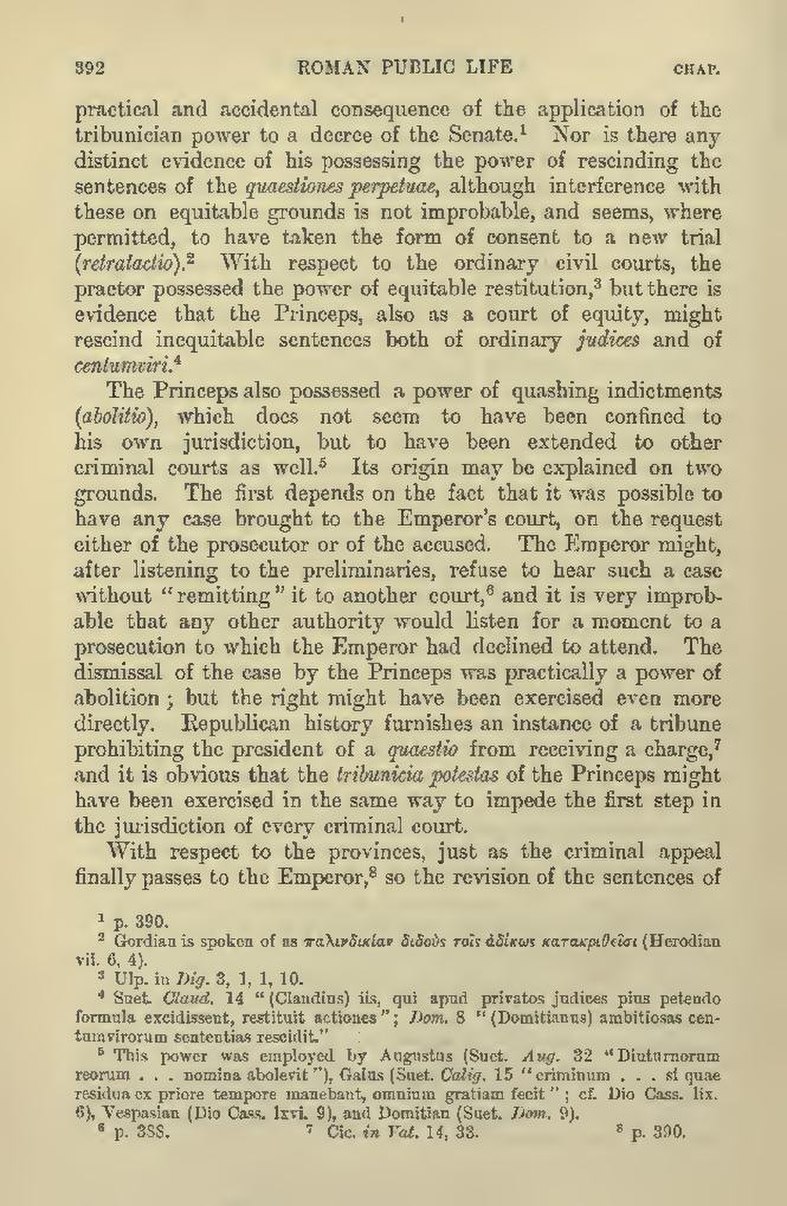practical and accidental consequence of the application of the tribunician power to a decree of the Senate.[1] Nor is there any distinct evidence of his possessing the power of rescinding the sentences of the quaestiones perpetuae, although interference with these on equitable grounds is not improbable, and seems, where permitted, to have taken the form of consent to a new trial (retratactio).[2] With respect to the ordinary civil courts, the praetor possessed the power of equitable restitution,[3] but there is evidence that the Princeps, also as a court of equity, might rescind inequitable sentences both of ordinary judices and of centumviri.[4]
The Princeps also possessed a power of quashing indictments (abolitio), which does not seem to have been confined to his own jurisdiction, but to have been extended to other criminal courts as well.[5] Its origin may be explained on two grounds. The first depends on the fact that it was possible to have any case brought to the Emperor's court, on the request either of the prosecutor or of the accused. The Emperor might, after listening to the preliminaries, refuse to hear such a case without "remitting" it to another court,[6] and it is very improbable that any other authority would listen for a moment to a prosecution to which the Emperor had declined to attend. The dismissal of the case by the Princeps was practically a power of abolition; but the right might have been exercised even more directly. Republican history furnishes an instance of a tribune prohibiting the president of a quaestio from receiving a charge,[7] and it is obvious that the tribunicia potestas of the Princeps might have been exercised in the same way to impede the first step in the jurisdiction of every criminal court.
With respect to the provinces, just as the criminal appeal finally passes to the Emperor,[8] so the revision of the sentences of(Herodian vii. 6, 4).]
- ↑ p. 390.
- ↑ Gordian is spoken of as [Greek: palindikian didous tois adikôs katakritheisi
- ↑ Ulp. in Dig. 3, 1, 1, 10.
- ↑ Suet. Claud. 14 "(Claudius) iis, qui apud privatos judices pius petendo formula excidissent, restituit actiones"; Dom. 8 "(Domitianus) ambitiosas centumvirorum sententias rescidit."
- ↑ This power was employed by Augustus (Suet. Aug. 32 "Diuturnorum reorum . . . nomina abolevit"), Gaius (Suet. Calig. 15 "criminum . . . si quae residua ex priore tempore manebant, omnium gratiam fecit"; cf. Dio Cass. lix. 6), Vespasian (Dio Cass. lxvi. 9), and Domitian (Suet. Dom. 9).
- ↑ p. 388.
- ↑ Cic. in Vat. 14, 33.
- ↑ p. 390.
